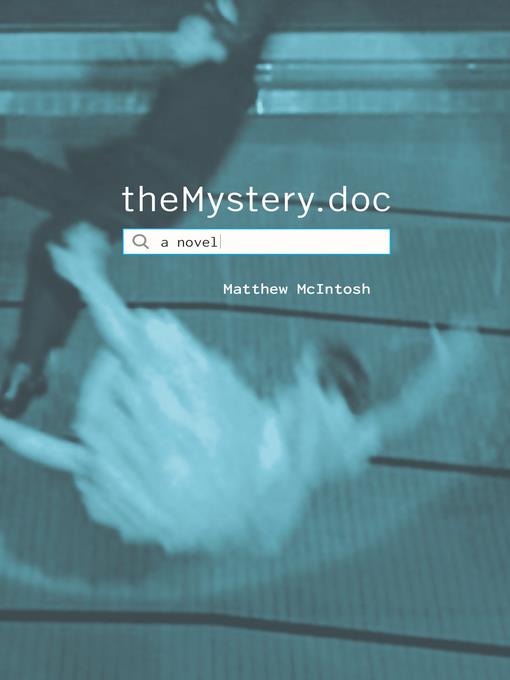
theMystery.doc
A Novel
کتاب های مرتبط
- اطلاعات
- نقد و بررسی
- دیدگاه کاربران
نقد و بررسی

September 4, 2017
McIntosh’s second book (after Well) is 14 years in the making, an audacious, sprawling, messy, and aptly titled antinovel that rarely subscribes to a conventional narrative format. The volume is comprised largely of fragments of miscellaneous, seemingly arbitrary exchanges and entries from digital and analog sources, including emails and chats, voice and video recordings, photographs, film stills, lines of computer code, typographical symbols, and plenty of blank spaces. “Themystery.doc” is the title of a file that the (arguably) main character of the book, a man who wakes up with no recollection of his life or identity to discover that he’s at work on a follow-up to his debut novel, finds on his computer. Mixed in are materials that appears nonfictional and undeniably factual biographical snippets from the author’s life (such as an amateur snapshot of McIntosh’s first book). In these portions, readers learn about the main character, his father’s battle with brain cancer, and his process for writing what may or may not be the gigantic book they are reading. This is a strange and unclassifiable work, which brings to mind visually stimulating projects like Mark Z. Danielewski’s House of Leaves. It will certainly find a following among fans of literary puzzles.

August 15, 2017
A vast, beguiling, but mixed-bag postmodern novel of ideas, misread intentions, and robots, told in words, pictures, symbols, and even blank pages.After a long absence following the 2003 publication of his ambitious but much shorter novel, Well, McIntosh returns with a sprawling yarn that at first plays with the conventions of the mystery genre; a writer awakens to find that he cannot remember who he is, while a beautiful woman asks gently, "You all right, babe? You look kind of dazed." He is even more puzzled to find a blank document on his computer--if it is indeed his computer in his own house--with the title "themystery.doc," which, a helpful friend reminds him, he has described as "a post-post-neo-modern mystery story." Shades of meta--and with a Schrodinger-ian dead cat to boot. If the reader isn't similarly dazed at this point, then he or she hasn't quite appreciated what's going on in a tableau as blurry as our protagonist's glassless vision. Now, why can't he remember where and who he is? One clue is that his head hurts--and, given the diet of drugs that flows through the book, it's small wonder, to say nothing of the spasms of violation and violence. Like kindred spirits William Vollmann and Mark Danielewski, McIntosh aspires to philosophy; one preoccupation is religion, with small lessons delivered here and there by characters like the plumber who snakes the drain while describing "a system of commerce which was run according to Christian principles," aspirationally called "Kingdom of Heaven, Incorporated, International." It being a mystery, the angel of death hovers always in the wings, with tabloid-ish news flashes, photos of the twin towers collapsing, and so forth to remind us of our mortality--and, it seems, our vulnerability in the face of the helpful bots ("Hello, I am Michele, I am the website greeter") who pepper these pages. Perplexing but often wonderful; while some of this seems written in a self-indulgent private code, what is accessible can be provocative and fascinating.
COPYRIGHT(2017) Kirkus Reviews, ALL RIGHTS RESERVED.

September 15, 2017
McIntosh's latest (after Well) is a hefty, ambitious foray into the frontier of the novel. The self-referential story is about a writer who wakes up to discover that he doesn't remember who he is, nor does he recognize his wife or neighbors. Wrapped around and through this premise are myriad, seemingly unrelated, sections, including documented real-life dialogs, instant message transcripts, 9/11 call logs, excerpts from Dante's Inferno, personal photos, movie stills, censored passages, and pages of symbols. As the book proceeds, the writer discovers unsavory details about his unknown self and his possible impending doom. This book succeeds in broadening the possibilities of fiction and blurring the boundaries of the form; the instant messaging passages in particular cleverly shed light upon this microcosm of communication. As with any risky venture, however, some elements are less successful than others; for instance, the photos have a minor impact compared to the more textual elements. VERDICT This work redefines the concept of the page-turner, exploring the field of uninterpreted meaning that gives power to the audience while requiring much more effort to parse, echoing Mark Danielewski's creative use of text but with a more exploded narrative. Recommended for intrepid readers. [See Prepub Alert, 4/10/17.]--Henry Bankhead, San Rafael P.L., CA
Copyright 2017 Library Journal, LLC Used with permission.

May 1, 2017
Post-9/11, a young writer struggles with the follow-up to his first novel, seeking new means of expression as he combines pop-up ads, search results, text messages, and bits of classical literature to depict a man who awakens with no memory. One clue? An empty computer document called mystery.doc. This will get discussed as a big book--check out the page count.
Copyright 2017 Library Journal, LLC Used with permission.

























دیدگاه کاربران